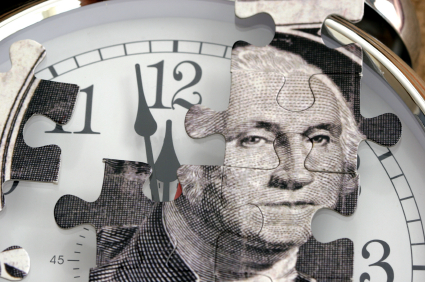By Joel Dresang
Approaching $1.5 trillion, the U.S. deficit is becoming a bigger target for government critics and investors who wonder what the federal budget imbalance means for their nest eggs.
“I get that question by clients every day,” says Bob Landaas, president of Landaas & Company. “I try to answer that it’s mostly about interest rates and earnings. But a lot of people want to talk about the deficit. They think that at some point it’s going to blow the country up.”
At 10% of the Gross Domestic Product, its largest point since World War II, the deficit poses a lot of serious concerns for the long run, Bob says, but investors with balanced diversified portfolios shouldn’t be too anxious about the issue at the moment. Here’s why:
1. It’s the best time to have a deficit.
Of course, we’d prefer always to have the government balance its budgets and squirrel away reserves for emergencies. But if ever economics warrants spending more than the government takes in, it’s during recessions – when revenues drop and public-sector money can both soften the severity of the downturn and regenerate economic activity in the absence of business and consumer spending. A recent report by the Congressional Budget Office notes that “deficits during or shortly after a recession generally hasten economic recovery.” Over the long run, however, deficits add to the federal debt, which could possibly trigger spikes in interest rates and inflation.
2. It’s early.
The economy is growing again after the worst recession since the Great Depression. Expansion should improve revenues and require less government support, which would ease up on the deficit. But it’s still shaky. The tax increases and spending cuts necessary to reduce the deficit have a chance of setting back the economy, the CBO report acknowledges. Mark Zandi, chief economist of Moody’s Analytics, warned last month that diverting resources to address the deficit too soon could possibly send the economy back into recession.
3. Politics – more than economics – tends to raise the specter of deficits.
The most vocal deficit hawks in the short run often have partisan motivations. Democrats made noise about the growing deficits under the Republican administration of President George W. Bush. Then-Vice President Dick Cheney is quoted in a biography of former Treasury Secretary Paul O’Neill as dismissing such criticism by saying that “Reagan proved that deficits don’t matter.” Now, as Democrats control both the White House and Congress, Republicans are decrying the deficit.
4. Help may be on the way.
Whether political or practical, ganging up on the deficit is gaining momentum. By Dec. 1, a bipartisan national commission is scheduled to propose how to balance the budget within five years, excluding interest payments. The panel also is supposed to make recommendations to improve the long-term fiscal outlook for the country, including ways to control entitlement programs such as Social Security, Medicare and Medicaid.
5. The big money isn’t worried yet.
As the CBO points out, the greatest harm of deficits and mounting federal debt would be if they lead to investors losing faith in the ability of the U.S. government to meet its obligations. The report says there is no known tipping point for such a crisis. But so far, investor confidence stands pat. Instead of suffering from a lack of demand or insistence on greater return for perceived risk, the bellwether 10-year Treasury note has been yielding around 3% – about half its historic yield.
Joel Dresang is vice president of communications at Landaas & Company.
Learn more:
The Congressional Budget Office recently reported on the deficit and possible long-term implications in a brief “Federal Debt and the Risk of a Fiscal Crisis.”
Other bipartisan groups following the deficit issue:
initially posted Aug. 6, 2010
